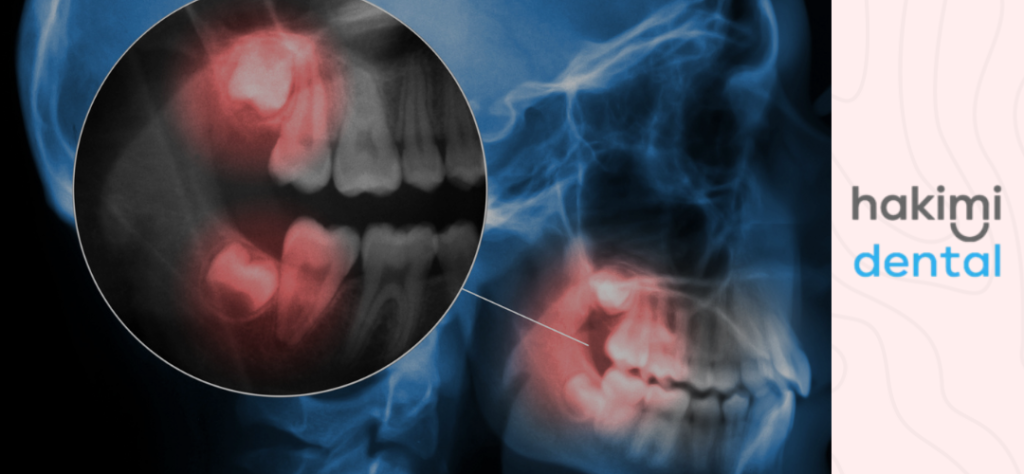Wisdom teeth, or third molars, are the last set of teeth to emerge, typically in the late teens or early twenties. While some people’s wisdom teeth come in without causing issues, others experience pain, swelling, and other discomforts. Knowing when to see a dentist about wisdom tooth pain is essential for managing symptoms, preventing complications, and ensuring your overall dental health.
In this guide, we’ll discuss why wisdom teeth can be problematic, common symptoms, and how to know when it’s time to seek help from a dentist.

Why Wisdom Teeth Cause Problems
Wisdom teeth can be problematic for several reasons:
- Lack of space: Most people’s jaws are not large enough to accommodate wisdom teeth comfortably. As a result, wisdom teeth may struggle to emerge fully or align properly, leading to overcrowding and pain.
- Impaction: Impacted wisdom teeth are those that don’t fully break through the gum line, often becoming trapped beneath the gums or pushing against neighbouring teeth. Impacted teeth are prone to infections and can cause swelling, pain, and damage to other teeth.
- Angle of eruption: Wisdom teeth sometimes come in at odd angles, pressing against neighbouring teeth or even growing horizontally. This positioning can lead to discomfort and potential damage to adjacent teeth.
- Difficulty keeping clean: Wisdom teeth are located at the very back of the mouth, making them difficult to reach and clean effectively. This positioning makes them more susceptible to cavities and gum infections.
When to See a Dentist About Wisdom Tooth Pain
Wisdom tooth pain can range from mild discomfort to severe pain that disrupts daily life. Here are some clear signs that it may be time to see a dentist about wisdom tooth pain:
1. Persistent pain or discomfort
If you’re experiencing constant pain or discomfort at the back of your mouth, especially around your wisdom teeth, it’s essential to consult a dentist. Wisdom tooth pain doesn’t typically resolve on its own, and persistent pain could indicate an issue such as impaction, infection, or inflammation.
2. Swelling in the gums or jaw
Swelling around the gums, jaw, or cheek area near the wisdom teeth is a common sign of impaction or infection. Swelling may be accompanied by tenderness, redness, and sometimes a “full” sensation in the jaw. If you notice any of these symptoms, it’s best to have them evaluated by a dentist, as swelling can indicate an underlying issue that may require treatment.
3. Bad taste or smell in the mouth
A foul taste or smell in the mouth near the wisdom teeth can be a sign of infection. When a wisdom tooth partially erupts, it creates a space that can easily trap food and bacteria, leading to infection. This condition, known as pericoronitis, often requires professional cleaning and, in some cases, extraction of the wisdom tooth to prevent further issues.
4. Difficulty opening your mouth or chewing
If you’re finding it difficult to open your mouth wide, chew comfortably, or if you experience pain when doing so, your wisdom teeth may be affecting the surrounding jaw muscles and nerves. This discomfort can also result from infection or inflammation caused by an impacted tooth.
5. Headaches or ear pain
Pain from impacted or infected wisdom teeth can radiate to other areas, such as the ears or the head. Many people don’t realise that their recurring headaches or earaches may be connected to their wisdom teeth. If you’ve been experiencing these symptoms along with jaw pain, a dental visit is recommended.
Why You Shouldn’t Ignore Wisdom Tooth Pain
Ignoring wisdom tooth pain can lead to more significant complications, including:
- Infection: Impacted or partially erupted wisdom teeth are prone to infection. Left untreated, infections can spread to nearby teeth, gums, and even other parts of the body.
- Damage to other teeth: If a wisdom tooth presses against the adjacent molar, it can cause erosion or damage to the neighbouring tooth, increasing the risk of decay, sensitivity, and gum disease.
- Cysts or tumours: Impacted wisdom teeth can sometimes form cysts, which are fluid-filled sacs around the tooth. These cysts can damage surrounding bone and teeth and may even lead to tumour formation in rare cases.
- Alignment issues: In some cases, the pressure from impacted wisdom teeth can shift the alignment of your other teeth, especially if you have already undergone orthodontic treatment.
Treatment Options for Wisdom Tooth Pain
The type of treatment needed for wisdom tooth pain depends on the specific issue. Your dentist will conduct an examination, often using X-rays, to determine the position of the wisdom teeth and the underlying cause of the pain. Here are common treatment options:
1. Monitoring and Pain Relief
If your wisdom teeth have room to grow in and are not causing immediate problems, your dentist may recommend simply monitoring them. In the meantime, over-the-counter pain relievers like ibuprofen can help manage mild pain, and saltwater rinses can ease gum discomfort.
2. Cleaning and Antibiotics
If an infection has developed around a partially erupted wisdom tooth, your dentist may perform a professional cleaning to remove trapped food and bacteria. They may also prescribe antibiotics to reduce infection and inflammation. This is often a temporary solution until a more permanent treatment, such as extraction, can be scheduled.
3. Extraction
In cases where wisdom teeth are impacted, causing significant pain, or are at high risk of infection or damage to other teeth, extraction may be necessary. Wisdom tooth extraction is a common procedure and can be done by a dentist or an oral surgeon, depending on the complexity of the case. The procedure involves removing the problematic tooth to relieve pain and prevent further issues.
4. Surgical Removal for Impacted Teeth
If the wisdom teeth are deeply impacted, a minor surgical procedure may be needed to remove them. This procedure is typically done under local anaesthesia or sedation, and the recovery time varies depending on the complexity of the extraction. Your dentist or oral surgeon will provide aftercare instructions to help manage discomfort and promote healing.
Preventing Wisdom Tooth Pain and Complications
While you can’t control whether your wisdom teeth will cause issues, there are steps you can take to reduce the risk of pain and complications:
- Regular dental check-ups: Routine check-ups allow your dentist to monitor your wisdom teeth as they develop. Early detection of potential issues can lead to more manageable treatment options.
- Good oral hygiene: Keeping your teeth and gums clean helps prevent infections, especially around partially erupted wisdom teeth. Brush thoroughly, floss daily, and consider using an antibacterial mouthwash.
- Avoid hard or sticky foods: Chewing on hard or sticky foods can aggravate wisdom tooth pain and lead to gum irritation around partially erupted teeth. Avoiding these foods can help minimise discomfort.
- Don’t ignore minor pain: If you notice mild discomfort in the area around your wisdom teeth, don’t ignore it. Often, minor symptoms are early signs of more significant problems, and early treatment can prevent complications.
In conclusion
Knowing when to see a dentist about wisdom tooth pain can make a huge difference in preventing serious complications and ensuring your comfort.
If you’re experiencing pain or discomfort around your wisdom teeth, don’t hesitate to book a consultation with our dentist. They can assess your situation, recommend appropriate treatment, and help you maintain your oral health.
FAQs
If you’re experiencing persistent pain, swelling, difficulty chewing, or bad taste in your mouth, it’s best to see a dentist. These symptoms can indicate issues like impaction, infection, or overcrowding, all of which require professional evaluation and possibly treatment.
Wisdom tooth extraction is generally done under local anaesthesia or sedation, so you shouldn’t feel pain during the procedure. Some discomfort and swelling are common after extraction, but this can be managed with pain relief and following aftercare instructions.
Yes, impacted or infected wisdom teeth can cause referred pain in other areas, such as the head and ears. If you’re experiencing these symptoms along with jaw pain, it’s a good idea to see a dentist.
The cost of wisdom tooth extraction varies based on factors like the complexity of the extraction and the practice. The costs can range from £100 to £300 or more per tooth, depending on whether a simple or surgical extraction is required.
While you can’t entirely prevent issues related to wisdom teeth, regular dental check-ups and good oral hygiene can help detect and reduce risks early. Avoiding hard foods and keeping the area clean may also help minimise discomfort.
